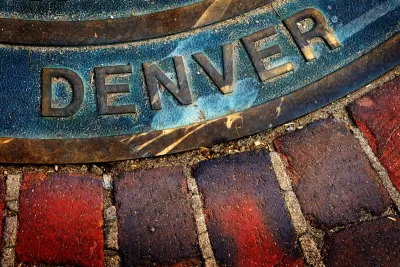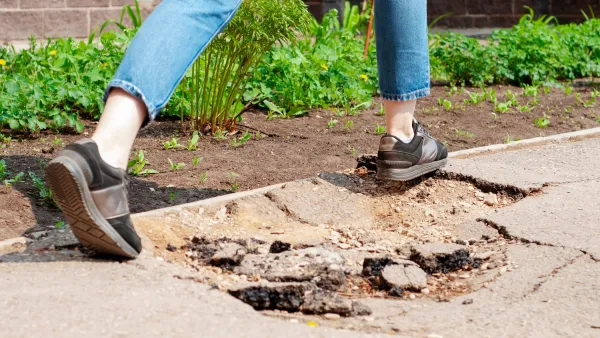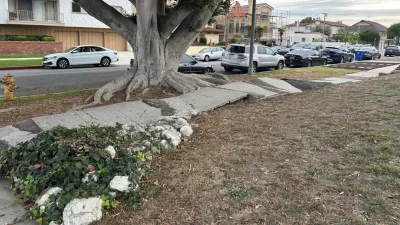The Colorado capital is the largest U.S. city to commit to maintaining its entire sidewalk network, funding repairs through a fee on property owners.

The city of Denver is taking a new approach to funding sidewalk repairs, reports David Zipper in Bloomberg CityLab.
Sidewalks are the unsung but essential infrastructure of millions of mundane daily journeys. But they tend to be chronically neglected — especially in neighborhoods whose residents rely on them most.
As Zipper explains, “Last month, the Mile High City began to fully fund and maintain its entire sidewalk network, taking over from private citizens. Most property owners will pay a $150 fee for sidewalks per year; a small minority with more than 230 linear square feet facing the street will pay $3.50 per additional square foot.”
The city is one of the first, and the largest in the country, to take on sidewalk repairs (most cities leave it up to private property owners, resulting in a patchwork of conditions). “According to a recent study, 23 of the largest 30 US cities make property owners responsible for sidewalk construction and maintenance, even as public agencies themselves pave streets and highways.”
After years of advocacy from residents, the city enacted legislation that wraps sidewalk repair fees into Denverites’ biannual stormwater fees. “The $150-and-up fee is projected to bring in $40 million per year, which will finance around $850 million in debt. To give a sense of scale, $850 million is roughly double the annual budget of Denver’s Department of Transportation and Infrastructure.” The approach could be a useful model for other cities, particularly as future federal funding for sidewalks and safe streets projects appears uncertain.
FULL STORY: Who Should Pay to Fix the Sidewalk?

Maui's Vacation Rental Debate Turns Ugly
Verbal attacks, misinformation campaigns and fistfights plague a high-stakes debate to convert thousands of vacation rentals into long-term housing.

Planetizen Federal Action Tracker
A weekly monitor of how Trump’s orders and actions are impacting planners and planning in America.

In Urban Planning, AI Prompting Could be the New Design Thinking
Creativity has long been key to great urban design. What if we see AI as our new creative partner?

King County Supportive Housing Program Offers Hope for Unhoused Residents
The county is taking a ‘Housing First’ approach that prioritizes getting people into housing, then offering wraparound supportive services.

Researchers Use AI to Get Clearer Picture of US Housing
Analysts are using artificial intelligence to supercharge their research by allowing them to comb through data faster. Though these AI tools can be error prone, they save time and housing researchers are optimistic about the future.

Making Shared Micromobility More Inclusive
Cities and shared mobility system operators can do more to include people with disabilities in planning and operations, per a new report.
Urban Design for Planners 1: Software Tools
This six-course series explores essential urban design concepts using open source software and equips planners with the tools they need to participate fully in the urban design process.
Planning for Universal Design
Learn the tools for implementing Universal Design in planning regulations.
planning NEXT
Appalachian Highlands Housing Partners
Mpact (founded as Rail~Volution)
City of Camden Redevelopment Agency
City of Astoria
City of Portland
City of Laramie





























